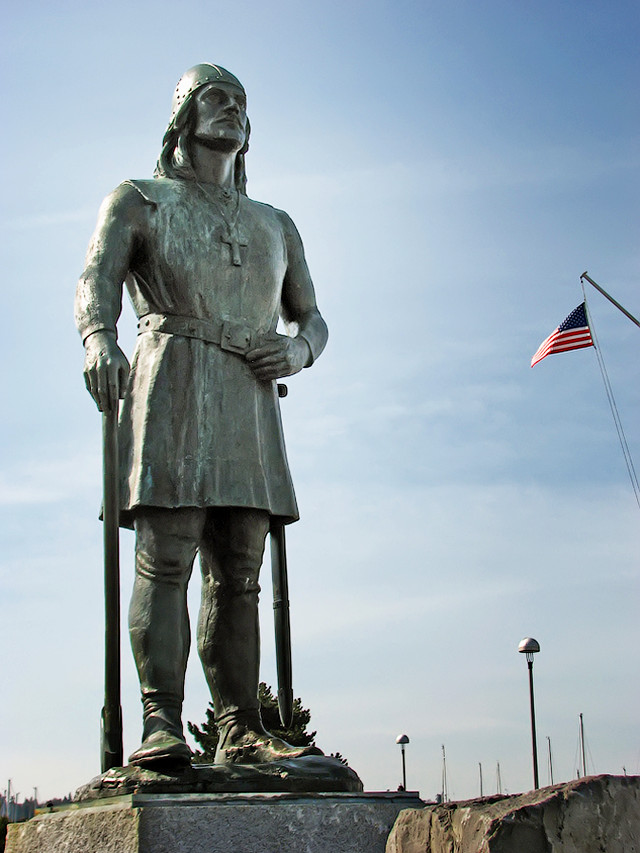
by John Copeland Tuesday, September 20, 2016

Seattle's Leif Erikson memorial statue. Credit: Steven Pavlov, CC BY-SA 3.0.
October has two holidays, just days apart, that celebrate two individuals both heralded as the discoverers of the New World: Leif Erikson and Christopher Columbus. Why do most of us celebrate Columbus Day but not Leif Erikson Day?
In elementary school, we all learned that, “In 1492, Columbus sailed the ocean blue,” but, Columbus was not the first European to discover the New World. Viking Leif Erikson was the first European known to have set foot in the New World, a full 500 years before Columbus even set foot on a ship.
Excavations in the 1960s in Newfoundland uncovered Viking artifacts confirming a site called L’Anse aux Meadows as the earliest European settlement known in North America. The dating of the site corresponds to Norse sagas about Erikson and a colony called Vinland.
Erikson and his crew ventured from their colony in Greenland to Newfoundland and stayed at the Vinland colony for a winter, then returned to Greenland in the spring. The only references to Erikson’s voyages and discovery are recorded in two Norse sagas: “The Saga of Erik the Red” and the “Greenlanders’ Saga.” Unfortunately, this caused his discovery to remain unknown to nearly all of Europe, which, at the time, was in the middle of the Crusades.
Some tales suggest that even Erikson may have been a latecomer to North America. There are tales of Irish monks, Phoenicians, West Africans and others who came to the New World in antiquity. Speculations about these stories capture the imagination and challenge conventional wisdom, but with the exception of Erikson, pre-Columbian contacts between the Americas and Asia, Africa or Europe have not been demonstrated. And although Columbus was certainly not the first to “discover” the Americas, he was definitely the last.
Columbus and his holiday are controversial today largely because of the way he and subsequent European explorers and settlers treated Native Americans. For years, there have been campaigns to celebrate an Indigenous Peoples’ Day. And, more than a century ago, there was a push to recognize Erikson over Columbus.
In 1892, the U.S. celebrated a Columbian Centennial: the 400th anniversary of Columbus’ journey to the Americas. At the time, the country’s recognition of him was a source of pride for many Italian-Americans and Italian immigrants. But not everyone was pleased that the U.S. was honoring Columbus. Scandinavian immigrants and Americans of Northern European descent wanted to celebrate Erikson instead.
This was a time of fervent anti-immigrant and anti-Italian sentiment in many parts of the United States, and the idea that there might be a story in which the first Europeans to reach America were not Southern Europeans was appealing.
Erikson’s nationality wasn’t the only thing that made some people favor him over Columbus. In the 19th century, many Americans were wary of the Catholic Church. Around the time of the Columbian Centennial, a Catholic organization, the Knights of Columbus, and several Italian-American groups began to lobby Congress to recognize Columbus Day. In 1907, the founder of Colorado’s first Italian newspaper helped establish the first official Columbus Day in his state; within a few years, 15 more states had adopted the holiday. By the time it became a federal holiday in 1971, most states already recognized Columbus Day.
Leif Erikson Day made its debut in the early 20th century too, but it never gained the same momentum. Like Columbus, Erikson also has a day on the calendar — Oct. 9 — thanks to President Lyndon Johnson, who signed a proclamation in 1964, but there’s no holiday to recognize it. Nonetheless, the president issues a proclamation about Leif Erikson Day every year.
The proximity of the days honoring Erikson and Columbus is a coincidence. Oct. 9 was chosen because it is the anniversary of the 1825 arrival in New York of the ship Restauration, which carried the first organized band of Norwegian immigrants to the United States.
Columbus’ “victory” over Erikson is partly due to early lobbying by Italian-Americans; but also because, even if he was not the first, Columbus arguably played a greater role in European migration to America.
Today, the clash between Columbus and Erikson has faded. The main question about Columbus Day is whether we should celebrate it at all. South Dakota celebrates “Native American Day” instead, and both Hawaii and Alaska do not celebrate Columbus Day.
In fact, Columbus Day’s current detractors might argue that the debate over whether Columbus or Erikson played a greater role in European migration to America is moot, since both of them “discovered” a place where, while they had never been, thousands of people already lived. Maybe it is time to inaugurate Explorers’ Day that acknowledges both of them.
© 2008-2021. All rights reserved. Any copying, redistribution or retransmission of any of the contents of this service without the expressed written permission of the American Geosciences Institute is expressly prohibited. Click here for all copyright requests.